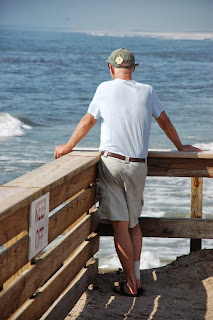One of the things you can do in your dotage is to go back and look at what you missed in your youth. I used to be reluctant to do this, for the ridiculous reason that I didn't like to admit a mistake. But now, with my pride starting to wear off, and plenty of time, I am working through a "bucket list" of art works that I originally turned my back on.
One of the mistakes I made as a rock critic in the sixties was
to ignore the Beach Boys’ 1966 album “Pet Sounds.” I heard people raving about it, but I was absorbed with new music from Bob Dylan, the Beatles,
Mothers of Invention etc. I loved the
Beach Boys, but with an innocent teenage love that didn’t take them all that
seriously, a love I thought I’d outgrown.
“Pet Sounds” didn’t look like an important work. Capitol Records' cover photo was a clumsily-staged shot of
the group feeding deer at a petting zoo.
In the sixties you could sometimes judge a record by its cover, but not
this one. Hidden inside was the masterpiece of rock’s greatest composer, Brian Wilson, and the
beginning of the story of his fall from innocence to despair – the story of the
sixties, played out in the life of a vulnerable genius.
The very last track is an elegy for innocence: In “Caroline No,” Brian’s falsetto keens, lamenting
the loss of “the girl I used to know:”
I remember how you used to say
you’d never change, but that’s not true. O Caroline you break my heart… The album ends with the last of
Brian’s pet sounds – dogs barking,
and the howl of a fast train passing, its whistle dipping suddenly in pitch and
then fading away.
But the real greatness of “Pet Sounds” lies under the
lyrics, in Brian's startling, sumptuous arrangements. He started with bass, percussion, and keyboards,
added a full studio orchestra, and then an incredible array of his own “pet
sounds:” from bottles and cans and a bicycle horn to a Theremin, the weird futuristic instrument
invented in the 1920's, played by moving one’s hands through electromagnetic
fields. The result is a collage of sound
that touches every texture of 20th century music. Example: “I’m Waiting for the Day,” a
dazzling use of dynamics, back and forth between doo-wop group rock and Brian's tenor/falsetto solo, backed by an oboe and then a flute. In three minutes, the track includes seven sections and ends
twice, first deceptively with a Debussy-like wave of strings, then for
real with a hammering back beat and the doo-wop chorus.
Don’t take my word for this.
In 1966, Paul McCartney called another jewel from the
album, "God Only Knows," the greatest song ever written.
And he said “Pet Sounds” was his inspiration for making “Sgt. Pepper’s
Lonely Hearts Club Band” the following year.
On first hearing “Pet Sounds,” McCartney said his response was “Oh, dear
me. This is the album of all-time. What are we gonna do?”
Brian Wilson said almost the same thing, a year earlier,
about the Beatles album “Rubber Soul.”
On hearing it, he said he felt the rules of rock had changed, his
competitive instincts were fired, and he set out to make “the greatest rock
album ever.”
In 1967, I became a rock critic by accident, when there was
barely such a thing as a rock critic.
Working in the newsroom of The New York Times, I was astonished to see the Times print a negative review of “Sgt. Pepper,” a review that called it “fraudulent.” I knocked
out a rebuttal and ran it downtown to The Village Voice, which published it the
next day. It said “Sgt. Pepper” was the
“most ambitious and most successful record album ever issued,” that the Beatles
had “turned the record album into an art form.”
This quickly became the accepted verdict, and I was accepted on its
merits as a rock critic, though I was really just a Beatle fan.
Now, I must amend my original verdict. “Sgt. Pepper” may have turned the record album
into an art form, but the groundwork for that was laid by “Pet Sounds.” As for the “most ambitious and successful
album ever,” I would have to vote for Brian Wilson’s masterpiece. “Sgt. Pepper” is a musical tour de force, but
it lacks a consistent sound or style – it’s a pastiche of styles ginned up,
less by the Beatles than their brilliant hired hand, producer George
Martin.
“Pet Sounds” is a musical tour de force in an integrated
style, the work of one artist who wrote the notes and most of the lyrics,
sang the lead vocals and played many of the instruments himself. The story it tells is honest and humble, the
story of a lonely genius rejected in love, frustrated in his art, beginning to
feel “I Just Wasn’t Made for These Times.”
Stuck at home this fall recuperating from surgery, I decided
to excavate my music collection in search of overlooked treasures. The greatest find was this 1990 re-issue of
“Pet Sounds,” with copious notes by Wilson
“Hang
on to your ego,
Hang on but I know that you’re gonna lose the fight..”
Hang on but I know that you’re gonna lose the fight..”
Brian Wilson lost his battles, as so many did in the
sixties. It took him a long time to come
back, and he’s never made it to where he wanted to be. But he gave us this treasure, tonal gold
that will last as long as recorded music. If you don't know "Pet Sounds," put it on your bucket list.
-- Copyright 2013 by Tom Phillips
-- Copyright 2013 by Tom Phillips


.jpg)

.jpg)

